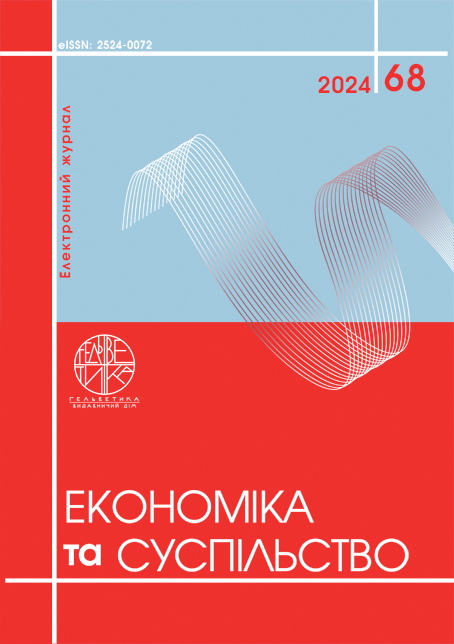THE EFFECT OF COMPENSATION PAYMENTS ON RETAINING TALENTED EMPLOYEES
Abstract
The article is dedicated to a comprehensive analysis of current issues regarding the impact of compensation benefits on retaining talented employees in contemporary organizations. It underscores how compensation strategies not only fulfill basic financial expectations but also address broader employee needs, thereby fostering deeper organizational commitment. The study explores a wide range of compensation types—including salary, bonuses, long-term incentives, and health and retirement benefits—as well as non-material motivators like recognition programs, career development opportunities, and organizational support for work-life balance. By addressing both financial and emotional needs, these incentives reinforce employees' sense of belonging, motivating them to maintain long-term associations with their employers. In examining competitive working conditions, the article highlights the critical role of individualized reward programs. Tailored benefits, such as performance-based bonuses, flexible work schedules, and enhanced medical coverage, are presented as effective tools for creating a supportive and engaging work environment. This environment not only meets the immediate expectations of employees but also strengthens their emotional attachment to the organization, significantly influencing their decision to remain within it. Furthermore, the article emphasizes the strategic importance of cultivating a positive employer brand. A well-regarded employer image contributes to the organization’s attractiveness in the labor market, helping to attract and retain skilled employees by fostering a reputation for supportive and fair employment practices. This brand-building effort, which may involve showcasing a commitment to employee welfare and corporate social responsibility, plays a substantial role in making an organization a preferred choice for current and potential employees. The article proposes practical recommendations aimed at enhancing the transparency and adaptability of compensation policies. These include regular evaluations of compensation packages in alignment with labor market trends, thereby ensuring that they remain competitive and responsive to employee expectations. Emphasis is placed on implementing flexible benefits that adapt to the specific needs of different employee demographics, such as providing options for professional development, skill acquisition, and career progression support, which in turn contribute to reducing turnover rates. An essential outcome of this research is the development of strategic guidelines for HR managers, focused on integrating professional growth opportunities and clear career paths within retention strategies. By supporting employees’ aspirations for personal and professional advancement, organizations not only increase employee satisfaction and loyalty but also cultivate a motivated, high-performing workforce capable of driving long-term success and stability for the company.
References
Alzaid, D., & Dukhaykh, S. (2023). Брендинг роботодавця та утримання працівників у банківському секторі Саудівської Аравії: посередній ефект від реляційних психологічних контрактів. MDPI. URL: https://www.mdpi.com/2071-1050/15/7/6115
Boucher, A., & Gomez, C. (2020). Перемогти у боротьбі за таланти, піклуючись про доглядальників. Mercer Marsh Benefits. URL: https://www.mercer.com/insights/total-rewards/employee-wellbeing/win-the-war-for-talent-by-caring-for-caregivers/
Chiekezie O. M., Emejulu G., Nwanneka A. Управління компенсаціями та утримання працівників у вибраних комерційних банках штату Анамбра, Нігерія. Архіви бізнес-досліджень. 2017. Т. 5, № 3. С. 115–127. URL: https://pdfs.semanticscholar.org/771f/a56b94c3b8cbe5ba949bbd2480e6482948e9.pdf/
De Smet, A., Dowling, B., Mugayar-Baldocchi, M., & Schaninger, B. (2022, 9 березня). Зараз пішли чи назавжди? Як виграти нову гру з талантами та повернути працівників. McKinsey & Company. URL: https://www.mckinsey.com/capabilities/people-and-organizational-performance/our-insights/gone-for-now-or-gone-for-good-how-to-play-the-new-talent-game-and-win-back-workers
Jenkins, B. M. (2022). Наслідки війни в Україні: економічні наслідки. RAND Corporation. Дослідження та коментарі. URL: https://www.rand.org/pubs/commentary/2023/03/consequences-of-the-war-in-ukraine-the-economic-fallout.html
Khan N. Чи прогнозує тренування та залученість працівників утримання працівників? Журнал з управління та бізнес-досліджень. 2018. Т. 12(3). С. 153–160. URL: https://www.aims-international.org/AIMSijm/papers/12-3-1.pdf
Schwartz, J., Kwan, A., & Liakopoulos, A. (2011, 1 квітня). Talent Edge 2020: Будуємо відновлення разом – що таланти очікують і як лідери відповідають. Deloitte. URL: https://www2.deloitte.com/us/en/insights/topics/talent/talent-edge-2020-building-the-recovery-together.html
Zholud Oleksandr. Міжнародна організація праці. Як війна вплинула на ринок праці в Україні? URL: https://www.ilo.org/resource/news/how-did-war-impact-ukrainian-labour-market
Герхарт, Баррі А., Мілковіч, Джордж Т. Компенсація працівників: дослідження та практика. Cornell University Library. URL: https://ecommons.cornell.edu/items/7ead2b2b-5151-4870-9e0a-d32abe2a611f
Фама, Юджин Ф., Дженсен, Майкл С. Розмежування власності та контролю. The Journal of Law and Economics, Том 26, № 2, 1983, 301–325. URL: https://www.journals.uchicago.edu/doi/10.1086/467037
Айзенгардт, Кетлін М. Агентська теорія: оцінка та огляд. The Academy of Management Review, Том 14, № 1, січень 1989, 57-74. URL: http://strategy.sjsu.edu/www.stable/pdf/Eisenhardt,%20K.%20M.,%201989,%20The%20Academy%20of%20Management%20Review%2014(1)%2057-74.pdf
Alzaid, D., & Dukhaykh, S. (2023). Employer branding and employee retention in the banking sector in Saudi Arabia: Mediating effect of relational psychological contracts. MDPI. URL: https://www.mdpi.com/2071-1050/15/7/6115
Boucher, A., & Gomez, C. (2020). Win the war for talent by caring for caregivers. Mercer Marsh Benefits. URL:https://www.mercer.com/insights/total-rewards/employee-wellbeing/win-the-war-for-talent-by-caring-for-caregivers/
Chiekezie O. M., Emejulu G., Nwanneka A. Compensation Management And Employee Retention Of Selected Commercial Banks In Anambra State, Nigeria. Archives of Business Research. 2017. Vol. 5, No. 3. P. 115–127. URL: https://pdfs.semanticscholar.org/771f/a56b94c3b8cbe5ba949bbd2480e6482948e9.pdf/
De Smet, A., Dowling, B., Mugayar-Baldocchi, M., & Schaninger, B. (2022, March 9). Gone for now, or gone for good? How to play the new talent game and win back workers. McKinsey & Company. URL: https://www.mckinsey.com/capabilities/people-and-organizational-performance/our-insights/gone-for-now-or-gone-for-good-how-to-play-the-new-talent-game-and-win-back-workers
Jenkins, B. M. (2022). Consequences of the War in Ukraine: The Economic Fallout. RAND Corporation. Research & Commentary. URL: https://www.rand.org/pubs/commentary/2023/03/consequences-of-the-war-in-ukraine-the-economic-fallout.html
Khan N. Does Training and Employee Commitment Predict Employee Retention? Journal of Management and Business Studies. 2018. Vol. 12(3), P. 153-160. URL: https://www.aims-international.org/AIMSijm/papers/12-3-1.pdf
Schwartz, J., Kwan, A., & Liakopoulos, A. (2011, April 1). Talent Edge 2020: Building the recovery together - What talent expects and how leaders are responding. Deloitte. URL: https://www2.deloitte.com/us/en/insights/topics/talent/talent-edge-2020-building-the-recovery-together.html
Zholud Oleksandr. International Labour Organization. How did the war impact the Ukrainian labour market? URL: https://www.ilo.org/resource/news/how-did-war-impact-ukrainian-labour-market
Gerhart, Barry A., Milkovich, George T. Employee Compensation: Research and Practice. Cornell University Library. URL: https://ecommons.cornell.edu/items/7ead2b2b-5151-4870-9e0a-d32abe2a611f
Fama, Eugene F., Jensen, Michael C. Separation of Ownership and Control. The Journal of Law and Economics, Vol. 26, No. 2, 1983, pp. 301–325. URL: https://www.journals.uchicago.edu/doi/10.1086/467037
Eisenhardt, Kathleen M. Agency Theory: An Assessment and Review. The Academy of Management Review, Vol. 14, No. 1, January 1989, pp. 57–74. URL: http://strategy.sjsu.edu/www.stable/pdf/Eisenhardt,%20K.%20M.,%201989,%20The%20Academy%20of%20Management%20Review%2014(1)%2057-74.pdf

This work is licensed under a Creative Commons Attribution 4.0 International License.


